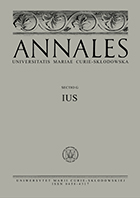Artykuł recenzyjny książki Andrzeja Maksymiliana Fredry Scriptorum Seu Togae et Belli Notationum Fragmenta. Accesserunt Peristromata Regnum. Symbolis Expressa
A Review Article of the Book by Andrzej Maksymilian Fredro Entitled Scriptorum Seu Togae et Notationum Belli Fragmenta. Accesserunt Peristromata Regnum. Symbolis Expressa
Author(s): Lech DubelSubject(s): Governance, Public Law, Government/Political systems, Book-Review
Published by: Wydawnictwo Naukowe Uniwersytetu Marii Curie-Sklodowskiej
Keywords: sarmatism; noble republicanism; equality; freedom; constitution mixed; self-limiting royal power; the common good; ethics; civil service; education; effectiveness of the law;
Summary/Abstract: A Review Article of the Book by Andrzej Maksymilian Fredro Entitled Scriptorum Seu Togae et Notationum Belli Fragmenta. Accesserunt Peristromata Regnum. Symbolis Expressa, Warsaw 2014, pp. 845 Published in 2014 (first ed. 1660) the treatise by Andrzej Maksymilian Fredro was a significant editorial event. It was the first time that Polish readers had been presented with a Polish translation of the originally Latin work by this author. This edition of Scriptorum combines the original Latin text and its Polish translation in one book. What is also significant, it is preceded by a comprehensive and detailed introduction and supplemented with very meticulous footnotes. The whole work is followed by an index of characters referred to in Scriptorum. In its introduction by Marek Tracz Tryniecki, the present work provides an extensive and very erudite presentation of the figure and intellectual achievements of Andrzej Maksymilian Fredro (p. 19–114). In fact, this is not so much a typical introduction as a scientific analysis which actually meets the requirements of a study. Not only does the author reconstruct the ideas, but also argues with some published interpretative theses concerning both the activities and the ideas of Aleksander Fredro. In his text Andrzej Maksymilian Fredro introduces and justifies the universal idea of self-limited power of the monarch. He justifies it with moral, political, psychological, legal and religious arguments, as well as with the historical experience and a comparative approach. A.M. Fredro’s work offers a commendation of republicanism and the mixed regime. According to Fredro, and many other political writers of the 16th and 17th centuries, the mixed regime continued to be the basis of the political regime of the Republic of Poland, where it was institutionally reflected in three estates: the Chamber of Deputies, the Senate and the King (p. 65). A.M. Fredro argues that such a regime enables the best control of conflicts and ensures freedom in the country. Another political postulate by this author is the commendation of the rule of law in the State. The work also discusses Fredro’s military ideas.
Journal: Annales Universitatis Mariae Curie-Skłodowska, sectio G – Ius
- Issue Year: 62/2015
- Issue No: 1
- Page Range: 93-106
- Page Count: 14
- Language: Polish

